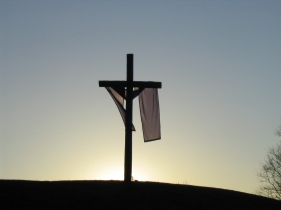By David Ettinger
Wondering Aloud
I remember those 2½ years clearly. In April 2010 I was laid off from my job as the staff writer at a megachurch because of dwindling tithes. I had been laid off twice before due to company-wide layoffs, and found employment within two weeks.

But this time it was different. There was little full-time work to be had for an aging journalist, so I had to meet my financial obligations however I could.
Part-time teaching at a local college helped, as did freelance writing assignments. But the income was not enough. I was forced to poach my savings account, and when that ran dry, I had to tap my retirement fund. By autumn of 2012, I had about three months’ worth of rent and bill money left.
During this time of drought, I battled to retain my faith and testimony. As I saw the funds dwindle to near extinction, I wondered aloud. “Lord,” I said. “You have a plan, right? You still plan to meet my needs, right? You’re really not going to add me to the population of the homeless, are You?”
Yes, I doubted. After 26 years of a faithful Christian walk, I began to wonder if the Lord had abandoned me. Doubt, regarding the Lord’s promises was new to me, but I knew I was not alone.
Most Christians doubt at one time or another, even the greatest man who ever lived.
The Most Famous Doubter
John the Baptist was a powerful prophet and the forerunner of Jesus Christ. With boldness he trumpeted the coming of Christ, condemned the Jewish leadership, and commanded the Israelites to cease their sinful lifestyles. He baptized Jesus, and heard God declare, “This is my Son, whom I love; with him I am well pleased” (Matthew 3:17). In fact, John himself proclaimed Jesus as “the Lamb of God, who takes away the sin of the world” (John 1:29).
Soon after, however, John was imprisoned. After several months, doubts began to hound him. One must have been, “If Jesus is the Messiah, why am I, His messenger, still in prison?” Another must have been: “If Jesus is the Messiah, why has he not established His kingdom here in Israel?”

So dismayed was John that he sent his disciples to ask Jesus, “Are you the one who is to come, or should we expect someone else?” (Matthew 11:3).
Jesus never flinched nor chastised his older cousin for his moment of doubt. Rather, he honored John by answering his question, explaining that the mission of His first coming was to bring humanity salvation from sin (vs. 4-6).
Jesus then extolled John, highlighted by this extraordinary declaration: “Truly I tell you, among those born of women there has not risen anyone greater than John the Baptist” (v. 11).
Don’t miss the magnitude of this: Jesus asserted the greatness of John when he was at the depths of despair. John’s incarceration had reduced him to doubting confusion; the once holy-rolling fire-breather of repentance reduced to questioning the essence of the One He had come to declare.
But What About James?
But what about this passage in the Book of James: “But when you ask, you must believe and not doubt, because the one who doubts is like a wave of the sea, blown and tossed by the wind. That person should not expect to receive anything from the Lord. Such a person is double-minded and unstable in all they do” (1:6-8).
The key here lies in two words. The first is the Greek word for “doubt,” which is diakrinomeros. This word does not suggest true heartfelt doubt which is wrestled with deep in the soul, but rather vacillation. It is the wishy-washy kind of doubt that says, “Hmm, I’m not sure about this Jesus fellow. Is He really God? Can He really do anything miraculous? I don’t know about this.”
The second word is “double-minded” which literally translates into “two-souled.” This is the person who doubts the very essence of Christ, that He is God and the Savior of the world. This kind of doubt is a soul-destroying doubt, one which inches just short of flat-out denial.

John’s doubt – and the doubt you and I experience at times – is different. We have accepted Jesus into our lives. We love Him. We have faith in Him. We proclaim Him. But once in a while, when circumstances turn on us, when we are tired and worried, downcast and confused, we let our human frailties take over.
We wonder if God is there, if He cares, if He still loves us. It is an honest doubt, a heartfelt doubt, a grievous doubt, and Jesus knows precisely what we are going through and does not condemn us for it.
Why Jesus Understands
No need to wax eloquent here, let me simply give you the explanation as to why Jesus understands your times of doubt and does not condemn you for it. Hebrews 2:14-18 says:
Since the children have flesh and blood, he too shared in their humanity so that by his death he might break the power of him who holds the power of death – that is, the devil – and free those who all their lives were held in slavery by their fear of death. … For this reason he had to be made like them, fully human in every way, in order that he might become a merciful and faithful high priest in service to God, and that he might make atonement for the sins of the people. Because he himself suffered when he was tempted, he is able to help those who are being tempted.
May this truth comfort you in your most despondent of times.
seekingdivineperspective
January 18, 2022
David, I agree wholeheartedly with everything you’ve said here. But the storyteller in me wants to know what happened next???
LikeLiked by 2 people
dettinger47
January 18, 2022
Good question!
LikeLike
dettinger47
January 18, 2022
Oh, I see what you mean. I got hired by Zion’s Hope. All in God’s timing.
LikeLiked by 1 person
Blue Collar Theologian
January 18, 2022
This is a needed post, David! I pray many are encouraged by this!
LikeLiked by 1 person
dettinger47
January 18, 2022
Thank you, Mandy.
LikeLiked by 1 person
Lisa Beth
January 18, 2022
Well, I’m very encouraged by your unfolding of Scriptures here. But brother, what happened, how did the situation turn out, did you go broke? Maybe there’s a part 2…😯
Thank you David for always taking us to His precious word.
LikeLike
dettinger47
January 18, 2022
I got hired, or rehired, but Zion’s Hope.
LikeLiked by 1 person
Tom
January 18, 2022
Thanks, David. After being laid off in 2019 at the age of 63, I was unemployed for 15 months and the assistance was drying up. I job searched but nobody wanted to hire a 63-64YO. I was really leaning on the Lord.
LikeLiked by 1 person
dettinger47
January 18, 2022
Same here. He provided in both our circumstances!
LikeLiked by 1 person
heavensreef
January 19, 2022
Oh David what a comfort this post is. We all doubt, it’s why we are human. JESUS knows that about us……it is why HE tells us HIS burden is light. May we walk MORE confidently this year, in HIS love for us. I must admit I have doubted when I am tired and weary. But praying for strength to endure always seems to calm my heart……I trust HIM dearly.
LikeLiked by 1 person
dettinger47
January 19, 2022
Thank you, Maxine. I believe you spoke for multitudes of believers.
LikeLiked by 1 person
heavensreef
January 20, 2022
Amen!!
LikeLiked by 1 person